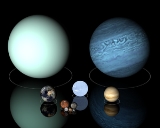
Planet
WordNet
noun
(1) (astronomy) any of the nine large celestial bodies in the solar system that revolve around the sun and shine by reflected light; Mercury, Venus, Earth, Mars, Jupiter, Saturn, Uranus, Neptune, and Pluto in order of their proximity to the sun; viewed from the constellation Hercules, all the planets rotate around the sun in a counterclockwise direction
(2) Any celestial body (other than comets or satellites) that revolves around a star
(3) A person who follows or serves another
WiktionaryText
Etymology
From , < variant of .
Noun
- Each of the seven major bodies which move relative to the fixed stars in the night sky—the Moon, Mercury, Venus, the Sun, Mars, Jupiter and Saturn.
- 1749, Henry Fielding, Tom Jones, Folio Society 1973, p. 288:
- The moon . . . began to rise from her bed, where she had slumbered away the day, in order to sit up all night. Jones had not travelled far before he paid his compliments to that beautiful planet, and, turning to his companion, asked him if he had ever beheld so delicious an evening?
- 1749, Henry Fielding, Tom Jones, Folio Society 1973, p. 288:
- Any of various rocky or gaseous spherical bodies orbiting the Sun, specifically the eight major bodies of Mercury, Venus, Earth, Mars, Jupiter, Saturn, Uranus, and Neptune. (The Galilean moons, four major asteroids, and the dwarf planet Pluto were formerly included, in the 17th, 19th, and 20th centuries respectively.)
- Any similar spherically-shaped body in orbit around a star or binary star which has cleared the debris out of its orbital path, but which has not attained nuclear fusion.
Declension
----

